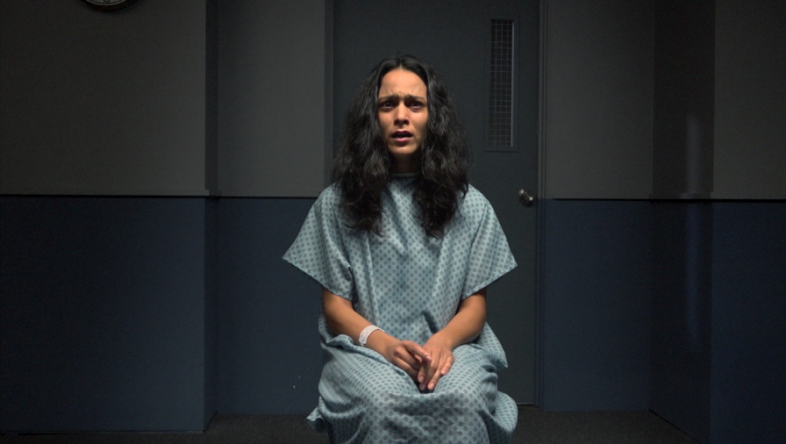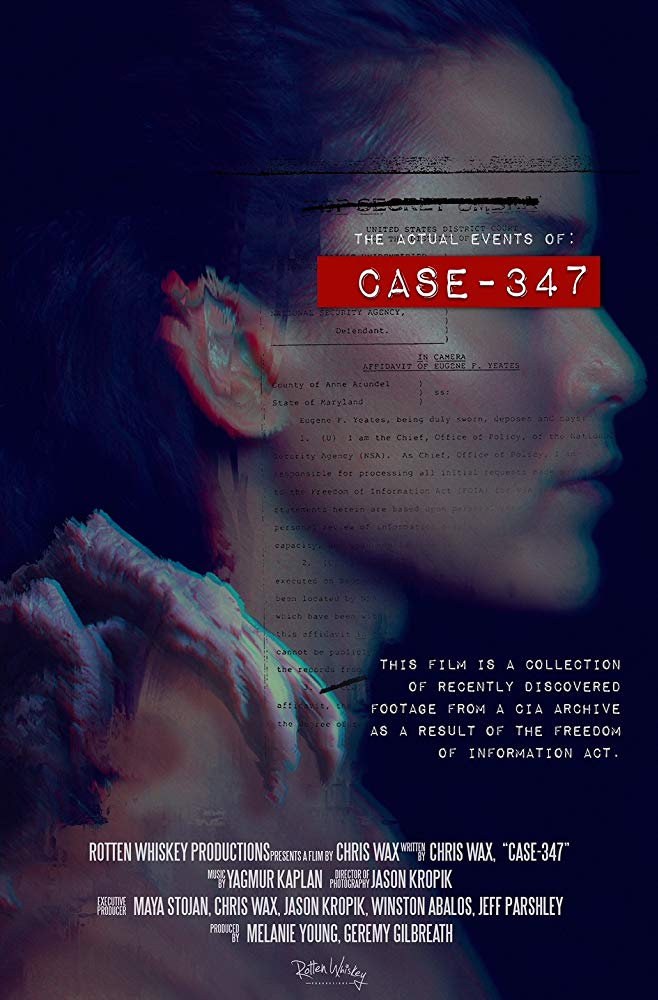
Director: Chris Wax
Writer: Chris Wax
Cast includes: Maya Stojan, Jason Kropik, Chris Wax, Melanie Young, and Richard Gilliland
Year: 2020
Find it on FLIXFLING, Vimeo on Demand, Vudu, Amazon, iTunes, and Google Play.
Synopsis: Mia Jenson (played by Maya Stojan), is a clinical psychology Ph.D. candidate and a true nonbeliever in the existence of aliens. She makes it her mission to prove herself right by capturing the stories of those who claim to have witnessed UFO phenomena if only to argue that believers are suffering from “mass psychological phenomena.” However, as Mia leads her documentary film crew to alien hotspots, including Area 51 and a New Mexico Ranch riddled with unexplainable occurrences, it becomes harder for her to ignore the obvious – that everyone deserves a chance to know the truth.
On March 4, I had the fortunate opportunity to ask Case 347’s writer and director, Chris Wax, some questions about his process and his latest film.
AH: Would you like to tell me a little bit about yourself and how you became interested in film?
Chris Wax: Well, I’ve been into art my whole life. I went to art school my whole life so it wasn’t something that came about late in life, you know? I went to school for performing and visual art that eventually led to film. This is my third film and my first feature so I’ve been doing festivals for years (I think ten years ago was the first festival I was ever in) and just building up to where I am able to do a feature film.
AH: It looks like you’ve done a little bit of everything – acting, directing, writing.
Chris Wax: I kind of started out in the independent film world and then went into television development for the studios for almost a decade. Then found myself back in the independent film world again doing this, so it was kind of full circle.
AH: Which would you say you enjoy the most if you had to choose? Do you have more fun in front of the camera? Writing?
Chris Wax: Writing is probably my favorite part of the process. I think being able to create in solitude at your own schedule is probably my favorite part.
Once you have a whole film crew together and twenty or thirty people on set it starts to become a little chaotic and as amazing as it is that everyone is coming together, I think the confusion of trying to execute one single vision, it’s cool, but it’s not as relaxing as being in your office.
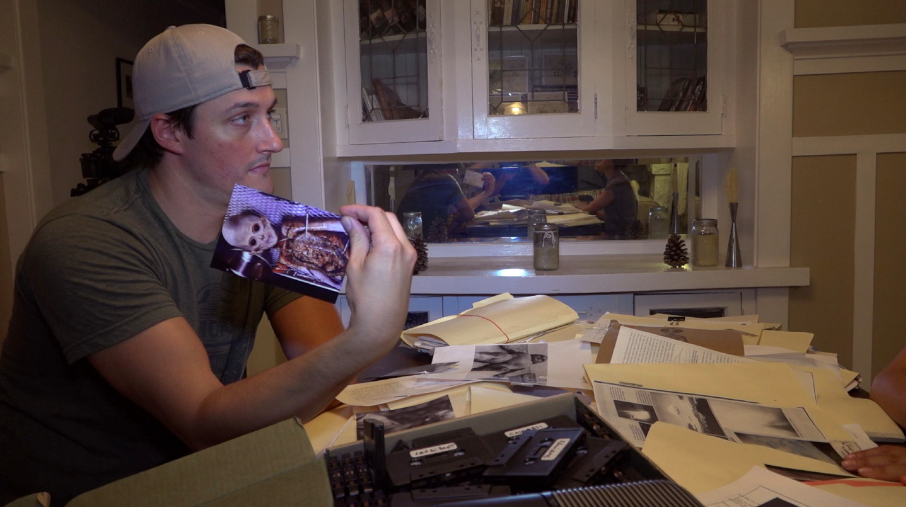
AH: Can you tell me how you came up with the idea and concept for Case 347?
Chris Wax: The idea and the way we executed the film into the found footage genre was really about trying to finance an entire feature-length film in a budget constraint. So we really had to get rid of the camera department, which was probably the biggest parts of really trying to cut the film’s cost in half, and as far as that, we really wanted to execute a found footage film we hadn’t seen before and tell a story that we could really be excited about. I wrote a pilot a few years back that was inspired by Roswell and I dug in so deep in the research for that pilot that I really found so many other things that I thought were interesting and so Case happened. Case [347] was based a lot on reported abductions and conspiracy stuff over the years I spent learning to implement into the script.
AH: I got a sense of that. As I’m watching the film, there were many times I thought of other cases I had heard about.
Chris Wax: Exactly. The ET Highway, the Black Mailbox, Area 51, the White Sands testing and Black-Eyed Kids… these are all different things that we touched on including the 900,000 people a year that go missing without any explanation. These are all real things, things recorded to have happened. If we can pluck people’s imaginations a little, tickle their brains a little in a way that you might want to Google something afterward, you’re going to find something because that’s how I came up with this in the first place.
AH: I have a lot of fun reading about this stuff on my own, so seeing it in the film and being able to relate to it works well with the documentary-style because these are real stories that have been told in some way or another.
Chris Wax: It’s hard to say that it’s based on ‘true events’ because the events themselves are recorded events so it’s based on true reports, on historical claims.
AH: Have films like Dark Skies, Fire in the Sky, etc. that touch on aliens and true stories influenced you directly in the making of Case 347?
Chris Wax: 100%. Fire in the Sky had a huge influence on me. Tracy Tormé is a friend of mine and Fire in the Sky was a movie that I grew up on and had a huge influence on me. And then, later on in life, being able to become friends with Tracy and having people like that influencing me, people like Don Smith who’d been writing about Roswell for decades. The UFO community, in reaching out to people in creating this film, has really embraced me in a way that was shocking because you would think that you’re trying to get into something that other people have been into for decades and think they might look at you like an outsider but it was the absolute opposite. Everyone was supportive and embraced me as much as they could. So yes, a ton of inspiration. I also loved Close Encounters when I was a kid, Spielberg with ET, and all these things from when I was a kid were inspirations and things that made me want to be an artist.
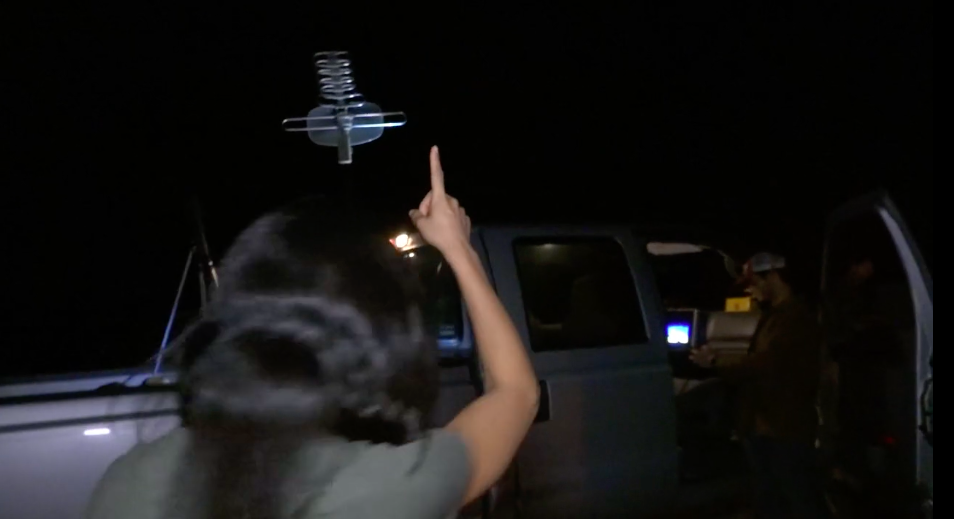
Mia Jenson (Maya Stojan) in ‘Case 347’
AH: Would you say that’s what steered you to make your first feature film in the science fiction/thriller genre rather than any other genre?
Chris Wax: I love the sci-fi genre. I love sci-fi fantasy. I love things that push our imagination and expand our belief systems or just give us something to escape into for an hour and a half. So to be able to create something like that, even on a small scale, is definitely a dream come true and something I want to continue to do on a bigger and bigger scale moving forward.
AH: I noticed that your shooting style includes what I like to call it the “less is more” approach to horror. You see it a lot with films like The Witch and even Dark Skies. For instance, with Case 347 when you finally see the thin men, there’s just a glimpse, just enough to wet your tongue. Was this an intentional way to ramp up your audience or something else?
Chris Wax: I think that’s what Hitchcock was basically known for – filming the reaction. Like the shower scene in Psycho, we see the curtain pulled across and the woman screaming before we see anything else and I think that’s the image that made that film so famous, that’s the image that wound up being on the poster. So “less is more,” I think, is coming back. It’s a style that people are being thrilled by more. I think when you finally see the “Third Act Curse,” I think a lot of films bring you on a journey and by the time they reveal what it is you’ve been afraid of for the first sixty minutes, you start to go, “Oh, that’s what it is?” And that’s always such a letdown. Maybe it just wasn’t frightening enough, maybe the CGI wasn’t good enough, or maybe the explanation wasn’t good enough. So, I wanted to avoid letting people have that experience and still be able to have a little [_] with our CGI and not have it so much in your face so that you think, well that wasn’t so scary. It is a bit of a balance because we’re a small film and under budget constraints, but also, I think it’s also more fun to leave it to your imagination. Whatever you picture for yourself is going to make you more afraid than whatever I can show you.
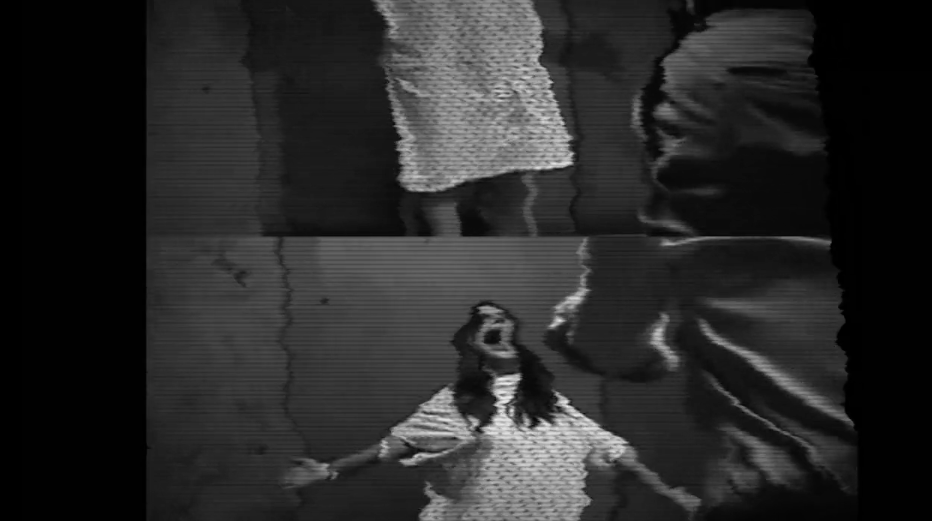
Mia Jenson (Maya Stojan) in ‘Case 347’
AH: For someone who is thinking about getting into film (writing, directing), what advice would you have for them?
Chris Wax: I would give the same advice that was given to me. I’ve been an artist since I was five. I was an art major in high school, an art major in college and then spent years teaching and constantly trying to better myself. I don’t think that that’s the way people have to go, you don’t have to be in academia to polish yourself, but what you do have to have is the structure to create yourself. You need to create constantly. I don’t care if you’re a writer, a filmmaker, whatever it is, you always have to always ‘be doing’. When I was in school, you needed to be always pushing film to the camera, now that we’re in the digital age, that red light better be blinking. The only way that you learn is by doing.
AH: That’s excellent advice and some that I’ve heard many times.
Chris Wax: Stephen King is a great inspiration for writers. He’s written so many incredible novels. He has a rule for himself to assign himself five pages a day. Whether he has the flu, whether he is uninspired that day, it doesn’t matter, there’s no excuse. And for somebody with the success of Stephen King, that’s good advice.
AH: So, you’re saying there’s no downtime for you?
Chris Wax: No downtime (laughs). Don’t burn yourself out. Take a week off if you have to, but I don’t believe in writer’s block. I don’t believe in the fear that a lot of artists have in looking at a blank canvass. It exists. It’s a real thing, but I just don’t believe in succumbing to it. You see a white canvass – fill it. You see an empty page – put words on it. It doesn’t have to be good words or words that you keep.
AH: Sometimes it’s just enough to get the juices flowing, too.
Chris Wax: That’s exactly right. You get one page of bad stuff going, and all of a sudden, the inspiration hits on page two. Now you’re on a roll.
AH: Do you believe in aliens? You don’t have to answer this one.
Chris Wax: I always tell people that when it comes to these things, anything in the unknown, I believe in the possibilities of any explanation. I think that there’s a line in the movie Contact with Jodie Foster and she’s asking her father if he thinks there’s anything out there. Her father is an astronomer. He says it would be a waste of space if we’re the only ones out here. So, I think that’s a great explanation. There’s literally an infinite amount of space and we are just one galaxy in clusters of galaxies. So, the idea that we’d be the only things out here seems a little egotistical. But I’ve never seen proof of aliens and I’m a ‘proof is in the pudding’ kind of person. But I believe in the possibility.
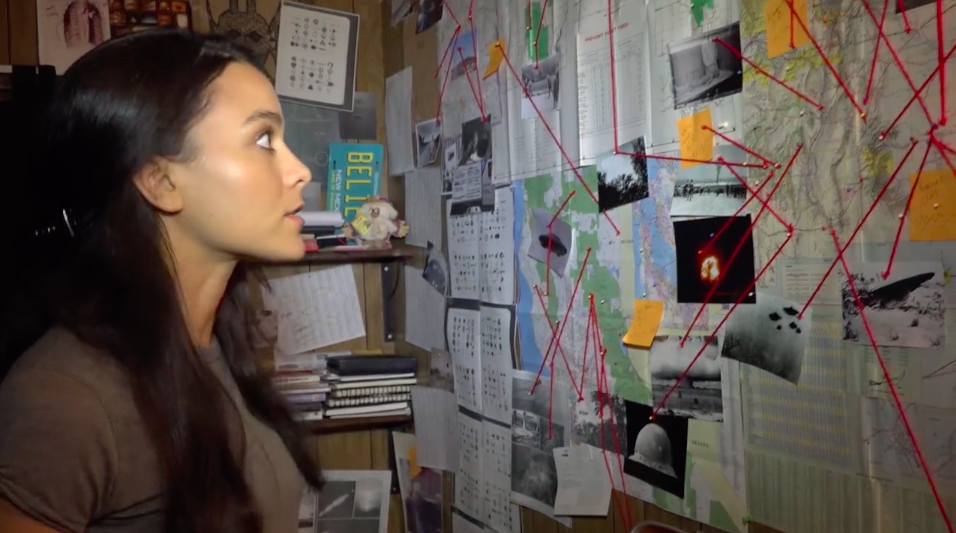
Mia Jenson (Maya Stojan) in ‘Case 347’
AH: Even in your film ‘Case 347’, I like the line from the character named Gustav, where he answers whether he believes in the possibility of aliens with “I believe I deserve to have the right to find out the truth, and so does everyone else.” I really like this line in the film because it sums up the message pretty neatly.
Chris Wax: I think a good rule of thumb for life, in general, is to maybe not walk into things with such a hardline idea of what you might think is the answer. Let the answers come to you or discover them and be open to what those answers might be.
AH: Would you like to share some projects that you are currently working on?
Chris Wax: I’m working on two different television projects with Winston A. Abalos. We’re working on a television pitch right now that is very much grounded in reality and tackles a lot of issues that are going on right now around the world and the LGBT community. I’m working on another project with the Jagger Brothers (Dean is from Game of Thrones and Ben is the writer/director of Corbin Nash). I’m working on another television pitch that is very sci-fi, very much in the vein of Case 347. I’m also working on a follow-up to Case 347 if the film does well and another investigatory film I have penned as well. I have a library of scripts and a few people that want to get behind features, and we have a lot of television content as well. We’ll see where the next few months go.
AH: Is there anything else that you would like readers to know?
Chris Wax: I hope that they enjoy the film as much as we did writing and creating it. I think it’s a fun film. The premier was amazing. The audience was laughing at the right times, jumping at the right times. It seemed like we got out of it exactly what we wanted to put into it, so hopefully, the audience at large, the global audience, will have the same reaction. I just hope people enjoy it and that people have a good time.
By Christina Persaud
[DISPLAY_ULTIMATE_PLUS]
[ajax_load_more post_type=”post” max_pages=”1″]

